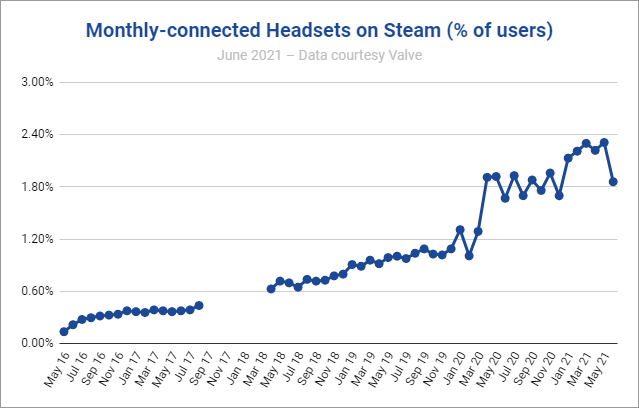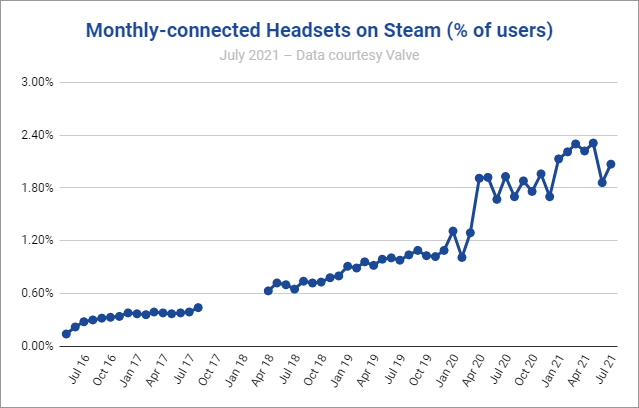Last month we pointed out a sharp drop in the number of users with VR headsets on Steam according to the latest data from Valve. There wasn’t a clear cut explanation as to why. This months data shows the numbers bouncing back closer to where they were before, but came short of a full recovery.
Last month we noted that the portion of users with VR headsets on Steam had dropped sharply from 2.31% to 1.86%, according to the data provided by Valve in the monthly Steam Survey. This was an anomaly compared to the occasional up-and-downs seen in the data previously.


The latest data from the company shows the drop may not have been as severe as it appeared, with the portion of users with VR headsets on Steam bouncing back to 2.07%. Not quite as high as before, but much closer to the bumpy ‘noise’ that we’ve seen in the data previously.


Monthly-Connected VR Headsets on Steam
Each month Valve collects info from Steam users to determine some baseline statistics about what kind of hardware and software is used by the platform’s population, and to see how things are changing over time, including the use of VR headsets.
The data shared in the survey represents the number of headsets connected to Steam over a given month, so we call the resulting figure ‘monthly-connected headsets’ for clarity; it’s the closest official figure there is to ‘monthly active VR users’ on Steam, with the caveat that it only tells us how many VR headsets were connected, not how many were actually used.
While Valve’s data is a useful way see which headsets are most popular on Steam, the trend of monthly-connected headsets is obfuscated because the data is given exclusively as percentages relative to Steam’s population—which itself is an unstated and constantly fluctuating figure.
To demystify the data Road to VR maintains a model, based on the historical survey data along with official data points directly from Valve and Steam, which aims to correct for Steam’s changing population and estimate the actual count—not the percent—of headsets being used on Steam.
As far as the actual number of headsets, our estimates had May’s 2.31% at just under 3 million monthly-connected headsets, June’s 1.86% at 2.47 million, and now July’s 2.07% at just under 2.8 million. So while the drop from May to June appeared to lose about 516,000 monthly-connected headsets, the growth from June to July appears to add back 320,000.
If we take July’s data to be more accurate than June, that ‘sharp drop’ looks closer to just 200,000 headsets rather than the 516,000 that appeared initially. That’s not insignificant, but it’s much closer to the normal up-and-down noise that we’ve seen in the data over the years, which has ultimately revealed a healthy upward trend over the long run.
These fluctuations, combined with a downswing of the data’s usual noise (and perhaps some actual reduction in the value of headsets on Steam in June), are a plausible explanation for the sharp drop, but not conclusive.
Share of VR Headsets on Steam
Having been released way back in 2016, the original HTC Vive is still going surprisingly strong, but has continued a slow and steady loss of share, now at 10.37% (−0.87%). Valve Index lost a bit, now at 16.23% (−0.45%), but remains the third-most used headset after Rift S at 17.79% (−0.69%). Rift S has seen a slow but steady downward trend and we wouldn’t be surprised to see Index overtake it as the second most used headset in the next month or two.
HTC’s Vive Pro 2 has only been available for two months now and has reached just 0.34% (+0.26%) of the share of VR headsets on Steam. Even this small, initial traction is enough to make it more popular than HTC’s Vive Cosmos Elite, which dropped to 0.08% (−0.06%).

